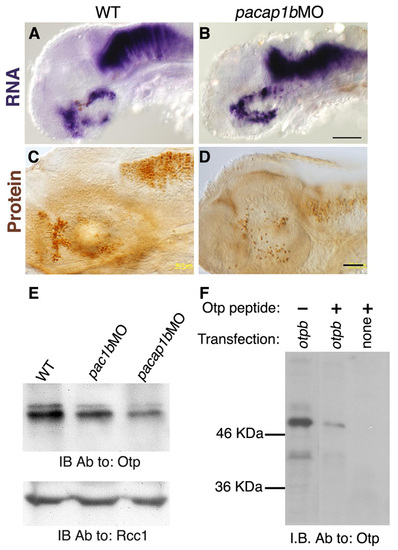
PACAP1b affects Otp protein levels. (a-D) Embryos were injected with either a buffer solution (WT, a,C) or pacap1b morpholino (pacap1bMO; B,D) and were thereafter (52 hours post injection) subjected to either in situ hybridization with an otpb-directed probe (a,B), or to immunohistochemistry with an anti-Otp antibody (C, D). The activity of pacap1bMO in each embryo was then evaluated by anti-tyrosine hydroxylase (TH) immunostaining. (E) Nuclear-enriched protein extracts from mock (WT), pac1MO and pacap1bMO injected embryos were subjected to western blot analysis with either anti-Otp antibody or anti-Rcc1 (internal control for a ubiquitous nuclear protein). (F) Specificity of the anti-Otp antibody. HEK293 cells were transfected with a cDNA encoding to the Otpb protein and monolayers were cultured for 24 hours before protein extraction and western blot. Specific immunoreactivity against a major protein band of ∼50 kDa was demonstrated by peptide antibody displacement. PVDF filters containing the fractionated cell lysate were then subjected to immunobloting (IB) with an affinity-purified anti-Otp antibody, which was either pre-incubated (+) with a synthetic Otp peptide or not (-). Ab, antibody; IB, immunoblot. Scale bars: (a,B) 100 μm; (C,D) 50 μm.
|

